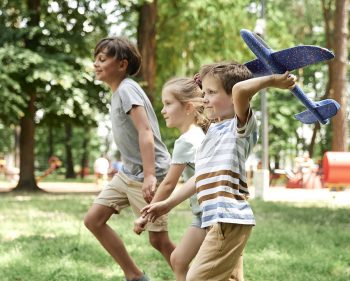Home /
Healing in Trauma for Children

By Serena Vess, MSSW Intern
The road to healing may feel impossible or out of reach for children and parents who have been impacted by trauma. A diagnosis of Post-Traumatic Stress Disorder (PTSD) or Other Specified Trauma and Stressor Related Disorder can feel like a permanent label on a child which is understandably scary. Below are a few myths that may be contributing to this anxiety revolving around trauma and healing.
Myth #1: PTSD isn’t curable. My child will always suffer.
Truth: The long-term prognosis for PTSD is good, and treatment frequently eliminates or reduces symptoms.
Myth #2: Healing from trauma will take several years’ worth of therapy.
Truth: Trauma Focused Cognitive Behavior Therapy (TFCBT) effectively improves a range of trauma-related outcomes in 8-25 sessions (roughly 2-6 months).
Myth #3: My child experienced trauma and there is nothing I can do to support them. I feel so helpless.
Truth: Parent involvement is a vital component of a child’s TFCBT treatment and can also help parents build skills to better support their children. Additionally there are other great resources available for parents that include tips on how to support children who have experienced trauma. Linked below are blogs posted by the Steven A. Cohen Military Family Clinic at Centerstone for parents regarding involvement and support.
Five Easy Ways to Support Children Exposed to Trauma
Why the Presence of a Parent/Caregiver/Attachment Figure is Essential to a Child’s Treatment
What is Trauma Focused Cognitive Behavior Therapy (TF-CBT)?
TF-CBT is an evidence-based treatment model for children and adolescents that are impacted by trauma. It is a particular kind of Cognitive Behavior Therapy that focuses specially on the impacts of trauma. TF-CBT consists of psychoeducation about child trauma, relaxation skills, cognitive coping skills, and trauma narrative and processing. TF-CBT also has an ongoing component for parent involvement through conjoint child and parent sessions. This may include teaching parents skills related to stress management, positive parenting, behavior management, and effective communication. Linked below is a fact sheet for TF-CBT published by the National Child Traumatic Stress Network that has more details on this treatment model including research evidence. Additionally, linked below, is a fact sheet for TF-CBT published by the Children’s Bureau.
Link for TFCBT Fact Sheet by NCTSN
Link for TFCBT Fact Sheet by Children’s Bureau
Healing Through TF-CBT
Multiple studies nationally and internationally have been conducted documenting the effectiveness of TF-CBT for improving a range of problems for children who have experienced trauma. Highlighted below are conclusions derived from some of these research findings.
- Community TF-CBT effectively improves children’s intimate partner violence-related PTSD and anxiety (Cohen, et al, 2011)
- TF-CBT, regardless of the number of sessionsor the inclusion of a trauma narrative component, was effective in improving symptoms in youth as well as parenting skills and the children’s personal safety skills. (Deblinger, et al, 2011)
- A culturally modified, group-based TF-CBT intervention was effective in reducing posttraumatic stress and psychosocial distress in children who have experienced trauma (McMullen, et al, 2012)
- TF-CBT was effective in reducing emotional distress and depressive symptoms in parents and was effective in improving how parents can support their children and manage their children’s behavioral difficulties. (Deblinger, et al. 2015)
We have several clinicians at the Steven A. Cohen Military Family Clinic at Centerstone trained and experienced in TF-CBT. For more information on how we may be able to help military children in need of extra support log on to the clinic’s website at https://centerstone.org/cohen-military-family-clinic/clarksville/.


